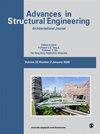用于电子冷却的散热器和含不同 PCM 的混合散热器热行为的数值研究
IF 2
4区 工程技术
引用次数: 0
摘要
本研究采用数值方法研究了用于电子冷却的 PCM 散热器和 PCM 混合散热器的熔化过程。首先,在铝翅片散热器中使用了三种热物理性质不同的 PCM(分别为 RT-28HC、RT-31 和 RT-54HC),并使用 ANSYS Fluent 软件在 3.6、4.2 和 4.8 kW/m2 的热通量条件下进行了三维随时间变化的分析。为了计算 PCM 散热器的增强率,选择了 45°C 和 60°C 的设定温度。结果显示,RT-54HC 是其中的最佳选择,因为它在 120 分钟模拟期结束时产生的散热器基底温度最低。最后,设计了两个混合散热器模型,分别命名为 HPCM1 和 HPCM2,并分析了它们在传热系数为 5、10 和 15 W/m K 时的冷却性能。结果表明,导热系数为 10 W/m2 K 和 15 W/m2 K 的 HPCM1 比 PCM-HS 模型的冷却效果更好。总之,这项研究为设计散热器和选择用于电子冷却的 PCM 类型提供了有用的指导。本文章由计算机程序翻译,如有差异,请以英文原文为准。
Numerical investigation on thermal behaviors of Heat Sinks and Hybrid Heat Sinks with different PCMs for electronic cooling
In this study, a numerical method was used to investigate the melting process of PCM-Heat Sink and PCM-Hybrid Heat sinks for electronic cooling. Firstly, three different PCMs, designated as RT-28HC, RT-31, and RT-54HC, with varying thermophysical properties, were used within aluminum finned heat sink and three-dimensional time-dependent analyses was conducted using the ANSYS Fluent software, at heat fluxes of 3.6, 4.2, and 4.8 kW/m2 . To calculate the enhancement ratio in the PCM-Heat Sink, setpoint temperatures of 45°C and 60°C were selected. The results revealed that RT-54HC is the best option among them, since it produced the lowest heat sink base temperature at the end of 120 min simulation period. At last, two hybrid heat sink models, designated as HPCM1 and HPCM2 were designed and their cooling performances were analyzed at heat transfer coefficients of 5, 10, and 15 W/m K. The RT-54HC was used as the PCM for hybrid heat sinks at a heat flux of 4.8 kW/m2 . It was observed that HPCM1, with heat conductivity coefficients of 10 and 15 W/m2 K were more effective than PCM-HS models for cooling. In conclusion, this study provides useful guidelines for designing heat sinks and selecting PCM types for electronic cooling.
求助全文
通过发布文献求助,成功后即可免费获取论文全文。
去求助
来源期刊

Advances in Mechanical Engineering
Engineering-Mechanical Engineering
自引率
4.80%
发文量
353
期刊介绍:
Advances in Mechanical Engineering (AIME) is a JCR Ranked, peer-reviewed, open access journal which publishes a wide range of original research and review articles. The journal Editorial Board welcomes manuscripts in both fundamental and applied research areas, and encourages submissions which contribute novel and innovative insights to the field of mechanical engineering
 求助内容:
求助内容: 应助结果提醒方式:
应助结果提醒方式:


